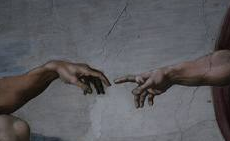
Just now I had made my weekly visit to our good friend Esther who resides in a nursing home, because of a rare debilitating disease of the nerves and muscles. This week she ‘celebrated’ her forty-second birthday. Presumably, and, however crazy it may sound, hopefully also, her last birthday. Despite everything, I may encourage her weekly with the Word. For all the troubles she faces, God’s Word is the rock solid foundation of her life. Anyway, as I walked out the door, I was accosted by the “neighbor” of Esther. I know him by sight, we greet each other and occasionally, we exchange a few words. A sympathetic, older gray man, of whom I knew that he painted.
“Are you a pastor?”, he asked me.
“Not really,” I answered, “but I come here to share with Esther Biblical truths. How so?”.
“I wanted to show you something and also like to know what a pastor thinks about it,” he said.
Curious, I asked if perhaps I might take a look?
“You just come along with me” and the man led me, in his wheelchair, to his room. There, quite a few paintings were hanging on the walls and to judge by the style, they were all of one painter. No doubt, of the man, himself.
“Look at this painting. May I ask what you see?”, asked the man, while he pointed with his finger.
I looked, but before the activity on the painting properly registered with me, the man started with his own explanation.
“You see here, of course, a reference to the well-known work of Michelangelo. God stretches out His hand to Adam”.
Yes indeed, I saw it too. But now I also clearly saw the words that were written on the arm of God. “Nein danke!”, “Geen dank!”, “No thanks!” and also in a few other languages, I believe. And underneath were written the words, in pitch-black boxes, (if I remember correctly) “hunger”, “disease” and “war”.
The man continued, “God created man, but what a misery it has brought! Already many thousands of years of immense suffering, hunger, war and so on. God is good, they says, but I see very little of it. For thirty-five years, I’ve been a school teacher and have had to assess the work of my pupils. I’ll tell you this: If I had to give God a mark for His work, then, from me, He would get a fat insufficient. And if it is true that He knew, in advance, all the misery that would follow, I would blame Him for having started it all. Is that love?”
I could hear in the voice of the man and could see from the poignancy with which he had displayed his vision on the canvas, that he was very serious about it all. He told of the early death of his son, due to epilepsy and how this was and still is incomprehensible to him.
“That is very hard”, I spoke softly, and then somewhat louder, “and now you expect that I will defend God? Let me say this: I assume that God with everything has a purpose.”
In the eyes of the man I saw anger, as he shook his head and made it clear that my answer was unacceptable to him.
“Here’s another painting” and the man pointed at the painting next to his version of Michelangelo. “Perpetuum mobile” was the title, and he explained that it refers to the love which there always is and will be, among people. “Endless love he said, “contrasted to the lovelessness in this painting” and with that again he pointed to his ‘Michelangelo’.
“From where would such love, among people, come, do you think?”, I asked him.
He paused, looked at me and said, “that’s a good question.”
“I have another question”, I said. “Do you think love can ever be seen without suffering?”
Again there was silence. Now a little longer. “I would have to think about this for a moment, but sometimes I get so very tired of all that thinking…”.
“If a jeweler wants to make an ornament sparkle, what does he do?”, So I tried again.
“Then he calls for me,” smiled the man.
I looked surprised and the man said, “I’ve been a year-long, a window dresser, myself.”
“Aha, then you know better than anyone else, that a jeweler will choose a dark background for that”, I said. “God is the Jeweler, Who can make the ornament of His love only sparkle against the dark background of suffering.”
The man understood, but was clearly not convinced. “I hope so,” he said. And in my heart I thought, Someday, you will know for sure!
———————————
Translation: Peter Feddema

